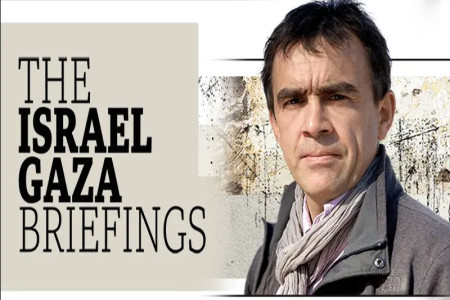The piece in Haaretz followed a report that held the Israeli prime minister and other senior figures in his administration personally responsible for failures over a stampede that led to the death of 45 people at a Jewish religious festival in 2021.
The newspaper, which is frequently critical of the prime minister, pointed out that Mr Netanyahu did not respond directly to the report. Instead, his Likud party suggested that the commission investigating the disaster was itself politically motivated.
Commentators across the political divide saw a parallel between the Mount Meron disaster and the 7 October attacks by Hamas, in which about 1,200 people were killed and more than 250 taken hostage - specifically Mr Netanyahu's refusal to accept responsibility.
It comes at a time when opinion polls do not make good reading for the prime minister.
While he has insisted that "absolute victory" is the only option to end the war, a poll last month by the Israel Democracy Institute (IDI) found that a majority of both Jewish (51%) and Arab Israelis (77.5%) said there is a low likelihood of achieving his aim to eliminate Hamas.
One survey, conducted back in November by Bar Ilan University, suggested that fewer than 4% of Israelis trusted Mr Netanyahu's decision-making over the war in Gaza.
While confidence in Mr Netanyahu is low, most Israelis have consistently supported the war in Gaza.
The IDI's Tamar Herman sees no contradiction in the suggestion that while most Israelis support the conflict and are less supportive of a future Palestinian state, they're still mistrustful of Mr Netanyahu.
He spearheaded unpopular judicial reforms before the Hamas attacks, and then "lost his security credentials after 7 October", Mr Herman said.
The lack of progress in releasing the remaining hostages is also a source of criticism.
Last weekend, thousands of relatives of the hostages and their supporters ended a four-day march outside his official residence in Jerusalem.
"Our government must ensure, above all else, that they come home, said Yair Mozes, whose 79-year-old father Gadi was kidnapped from Kibbutz Nir Oz. "This is the only humane thing that can happen."
Mr Netanyahu says they are a priority, but his decision to not send a delegation to ceasefire talks in Cairo this week was met with derision in parts of the Israeli media.
With the hide of a rhinoceros and an absolute conviction in the justness of his cause, Mr Netanyahu dug in even deeper this week.
He reiterated that troops would eventually launch an assault on the southern city of Rafah, where an estimated 1.4 million displaced Palestinians are sheltering. More than 30,000 people have been killed in Gaza, according to the Hamas-run health ministry, and much of the territory has been destroyed by Israeli shelling.
With more signs of a famine looming, international pressure has only grown.
A belligerent Mr Netanyahu told a military graduation ceremony this week that that the military "will continue to operate against all of Hamas's battalions".
"There is international pressure, and it is increasing," he said, "but it is precisely when the international pressure increases that we must close ranks among ourselves."
Mr Netanyahu was said to be livid this week when Benny Gantz, his arch-political rival and member of the unity war cabinet, set off on an unannounced and unsanctioned trip to visit key allies in Washington DC and London.
Mr Gantz is a former army general and chief of staff, and leads the more centrist National Unity party. If an election were to be held today, polls suggest Mr Gantz would secure enough votes in the 120-seat Knesset to form a coalition government and unseat Benjamin Netanyahu.
Some of Mr Gantz's appeal is simply that he is not Benjamin Netanyahu. He's a centrist and pragmatist who stands by Israel's military objectives. The openness with which he was received by senior US and UK officials was widely interpreted back home in Israel as a snub to Mr Netanyahu.
Others have criticised Mr Gantz, describing him as a "political parking lot". Transport minister Miri Regev, a Netanyahu ally, said Mr Gantz's visit looked like "some kind of subversion, like he's working behind the prime minister's back".
Mr Netanyahu is a seasoned political survivor. Both his critics and supporters say he will do almost anything to stay in power and keep his government together.
But his slim coalition relies on controversial far-right ministers and religious parties to keep afloat, and it is under strain.
In return for their support, the groups insist on financial concessions and the right of Orthodox Jews who are religious students to be exempt from military service. In a country where military service is universal, that has always been a contentious issue. But with Israeli soldiers being killed on active duty in Gaza, it's a policy coming under increasing pressure.
Defence Minister Yoav Gallant - also seen as a possible replacement for Mr Netanyahu - is known to be actively seeking to overturn the policy.
And the former head of the Shin Bet internal security service, Nadav Argaman, told a security conference in Tel Aviv this week: "An Israeli citizen is someone who serves the state as it determines, meaning either military service or national service."
Mr Netanyahu cannot be all things to all people.
When the war ends, there will be an inquiry into the events of 7 October, and who knew what, when.
Mr Netanyahu will come under intense scrutiny over what warnings his government was given and his subsequent response. If any findings are highly critical of his role, as many observers think they will be, he may not be able to dismiss them as easily as he dealt with this week's Mount Meron report.
By Wyre Davies


